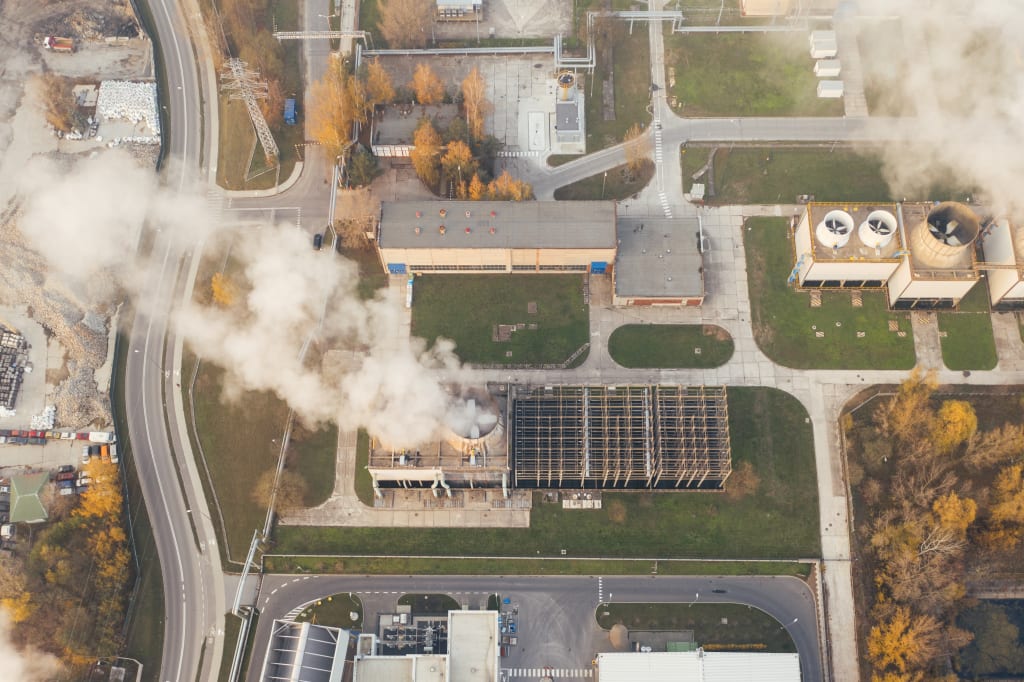Defending Against the Catastrophic Threats of Global Pollution, Planet in Peril
A Call to Action for a Sustainable Future

Introduction
The world has experienced remarkable expansion and development in recent decades, which has greatly accelerated industrialization and urbanization. However, this advancement has come at a price: a dangerous increase in global pollution. The ecosystems of the globe, people's health, and the economy are all seriously threatened by global pollution in all of its manifestations. The complexities of global pollution will be examined in this essay, along with how it impacts both the environment and people. We will learn about the disastrous effects of global pollution on biodiversity, including tainted air and water. If we do not move swiftly and collectively to address this important situation, we will also highlight the impending threats that lie ahead of us.
Knowledge of global pollution
Global pollution is the term used to describe how dangerous elements brought on by human activity have contaminated the air, water, and soil of the planet. These pollutants, which come from a variety of sources including traffic, agriculture, industrial activities, and poor waste disposal, add to the growing problem of global pollution. It is essential to know the complexities of global pollution in order to fully appreciate the scope of its effects on the environment and humanity. The effects of global pollution are extensive, ranging from harmful compounds poisoning water supplies to greenhouse gas emissions causing climate change. We can better address the pressing need to deploy sustainable behaviors and technology to alleviate the ubiquitous effects of global pollution by understanding the sources and pathways of these pollutants.
Effects of World Pollution
Environmental Consequences: Global pollution has a significant and wide-ranging impact on the environment. Pollutant emissions into the atmosphere have a substantial impact on the urgent problem of climate change, leading to more frequent and severe extreme weather events, rising sea levels, and global ecological disruptions. Carbon dioxide (CO2) and other greenhouse gases build up in the atmosphere, trapping heat, amplifying the greenhouse effect, and warming the earth.
Moreover, freshwater resources and aquatic life are seriously threatened by global pollution. Rivers, lakes, and oceans are contaminated by water pollution brought on by industrial discharges, agricultural runoff, and poor waste disposal. Because toxic chemicals and marine life undermine sensitive biological equilibrium, aquatic environments suffer. In turn, this has an effect on the lives and general well-being of the communities that depend on these resources for food and economic activity as well as the biodiversity of these water bodies.
Inspiring collective action to protect our planet's fragile ecosystems and biodiversity requires an understanding of the extensive environmental effects of global pollution. In order to protect the Earth from the catastrophic impacts of global pollution, it is essential to emphasize sustainable habits, conservation initiatives, and cleaner technologies.
Effects on health: The effects of global pollution on human health are grave. Significant dangers to respiratory and cardiovascular health are posed by air pollution, which contributes significantly to global pollution. Asthma, bronchitis, and chronic obstructive pulmonary disease (COPD) are just a few of the respiratory conditions that can develop as a result of exposure to fine particulate matter (PM2.5) and other air pollutants. Long-term air pollution exposure has also been linked to a higher risk of heart conditions, including heart attacks and strokes.
Waterborne infections and chronic health issues are also transmitted by soil and water contamination brought on by global pollution. Cholera and other waterborne diseases can result from ingesting or coming into contact with contaminated water. Additionally, contaminants in the soil can be absorbed by crops and eventually enter the food chain.
Global pollution has immediate and long-term health repercussions that can affect people's quality of life and general well-being in people and communities all over the world. The urgent need to adopt sustainable practices, reduce emissions, and assure access to clean air, water, and soil for a healthier and more resilient population is highlighted by the adverse impacts of global pollution on human health.
Economic Consequences: The world's economies suffer significantly as a result of global pollution. Pollution has numerous effects on the economy, some of which are startling. First and foremost, the costs of healthcare related to illnesses and diseases brought on by pollution might be high. The cost of treating cardiovascular illnesses, respiratory ailments, and other health problems brought on by air and water pollution puts a strain on healthcare systems and public finances.
Environmental restoration operations are also necessary as a result of pollution to undo the harm done to ecosystems and natural habitats. The financial burden is increased by the costs associated with restoring damaged land, cleaning up polluted water bodies, and reducing the consequences of air pollution.
Additionally, companies that depend largely on natural resources are more susceptible to the effects of pollution. Industries including agriculture, fishing, and forestry could experience decreased production and higher operating costs as a result of the harm that pollution is causing to ecosystems and the depletion of resources.
Current Statistics and Trends
In order to address this urgent environmental crisis, it is crucial to understand the present trends and statistics of global pollution. Carbon dioxide (CO2), methane (CH4), nitrogen oxides (NOx), and particulate matter are the main pollutants that contribute to global pollution. These pollutants are produced by a variety of human activities, including the burning of fossil fuels, numerous industrial operations, and agricultural practices. They have a considerable impact on environmental deterioration and the acceleration of climate change.
High industrial activity and dense population make urban areas particularly vulnerable to pollution. Manufacturing and production facilities found in industrial zones are substantial contributors of air and water pollution. Unfortunately, unregulated emissions and poor waste management methods make pollution problems in some areas with minimal environmental rules even worse.
Policymakers and environmental organizations can more effectively focus their efforts by identifying hotspots of pollution with the support of data collection on current trends and pollution statistics. We may try to implement targeted remedies and embrace sustainable habits to limit the negative consequences of pollution on our world by knowing the patterns and sources of global pollution.
Fight Global Pollution
Cooperation & Agreements on a Global Scale: Strong international collaboration and coordinated effort are needed to address global pollution. Global pollution is a problem that transcends national boundaries, necessitating coordinated efforts from all countries. International agreements, such as the Paris Agreement, are essential in promoting this kind of cooperation. The 2015 Paris Agreement brings nations together to set challenging goals for decreasing greenhouse gas emissions in an effort to prevent climate change and its effects. Countries work together to keep global warming well below 2 degrees Celsius above pre-industrial levels by committing to particular emission reduction goals.
In order to address global pollution, international cooperation is essential because no one country can handle this difficult problem by itself. These accords are essential to building a more resilient and sustainable future for everyone because they promote collaboration, and knowledge sharing, and support poor nations in their sustainability efforts.
Technological advancements: Technology advancements are essential to the fight against global pollution and the development of a cleaner, more sustainable future. With the potential to drastically reduce greenhouse gas emissions and their contribution to global pollution, clean energy alternatives have emerged as an appealing replacement for fossil fuels. Renewable energy sources are becoming more effective and widely available thanks to developments in solar, wind, and hydroelectric power technology, offering a workable solution for lowering carbon footprints.
Another area where innovation is revolutionizing the fight against global pollution is electric mobility. Since electric vehicles (EVs) have no exhaust emissions, they are growing in popularity as they help to clean up the air in cities and lessen transportation-related pollution, which accounts for a sizable portion of global pollution.
Effective waste management techniques are also essential for reducing pollution. As recycling techniques have improved, more materials can now be reused, which lessens the demand for production methods that use a lot of resources. garbage-to-energy technology can also transform garbage into clean energy, reducing pollution and landfill waste even further.
Embracing these technological advancements offers a hopeful route to a future that is cleaner and more sustainable. We can effectively tackle global pollution and preserve the health of our planet for future generations by continuing to invest in research and development, encouraging technological adoption, and cultivating a culture of sustainability.
Personal Efforts: The fight against global pollution requires both collective and individual actions. Systemic improvements are necessary, but we shouldn't undervalue the impact of individual actions. Making thoughtful decisions each day can help to drastically reduce pollution and our ecological footprint.
Reducing the usage of single-use plastics is one of the most effective actions people can take. These polymers contribute to the rising problem of plastic pollution by frequently ending up in landfills or contaminating rivers. People may help stop the growth of plastic trash by choosing reusable alternatives and recycling properly.
Another essential component of individual efforts to address global pollution is water conservation. Freshwater resources are limited, and excessive water use can cause water scarcity and wastewater discharge pollution. The stress on our water supplies can be reduced by doing collectively simple actions like repairing leaking faucets, utilizing water-saving appliances, and establishing thoughtful water usage habits.
Pollution can be significantly decreased by using energy-efficient equipment and consuming less electricity at home. Reduced reliance on fossil fuels as a result of lower energy demand means less greenhouse gas emissions and less air pollution.
Individuals can be effective change agents in the fight against global pollution by becoming informed and adopting sustainable decisions. These individual activities can have a beneficial ripple effect through group efforts, motivating others to join the cause for a cleaner, healthier planet.
Obstacles and Challenges
Interests in politics and the economy: The urgent need to combat global pollution regularly collides with political and economic interests. Even while protecting the environment is essential for the health of our world and future generations, some sectors and businesses may put their immediate profits before long-term sustainability. This conflict of interest may prevent the essential laws and measures for pollution control from being put into effect.
Strong industries, such as those wholly dependent on the extraction of resources or the use of fossil fuels, may fight against environmental rules that might have an adverse effect on their bottom lines. These industries' political clout and lobbying efforts can impact policy decisions, putting off or weakening efforts to reduce pollution.
Additionally, particularly in areas that are largely dependent on polluting industries, political leaders may favor economic development and job creation over environmental preservation in some circumstances. The development and implementation of policies aiming at reducing global pollution may be made more difficult by this trade-off between economic growth and environmental protection.
A careful balance must be struck between expanding sustainable practices and encouraging economic growth in order to overcome these obstacles. Policymakers must take into account the long-term effects of unmanaged global pollution and seek to develop incentives for businesses to embrace sustainable business practices and greener technologies. We can achieve a harmonious balance that takes into account both political and economic interests while protecting our planet from the catastrophic effects of global pollution by encouraging communication and collaboration amongst stakeholders and putting in place appropriate rules.
Lack of knowledge and instruction: Making progress in resolving this crucial issue may be significantly hampered by the lack of knowledge and education on the effects of global pollution. People may not understand the importance of taking action if they are not aware of the extensive effects of pollution on the environment, human health, and economies.
In order to increase public understanding and engagement with environmental issues, effective communication, and education are crucial. Campaigns, educational initiatives, and media outreach aimed at increasing public awareness of the effects of global pollution can aid in making people more aware of the scope and gravity of the issue.
People can better understand how these problems are interconnected by being informed on the connection between pollution and climate change, air and water quality, and the loss of biodiversity. This understanding inspires people to adopt sustainable habits in their daily lives and promotes a sense of responsibility.
Additionally, informed and involved residents are more likely to support pollution control initiatives and push for stricter environmental regulations. Governments, NGOs, and other stakeholders must fund educational programs to give people the power to decide for themselves and take an active role in the fight against global pollution. We can strengthen the worldwide movement dedicated to defending the environment and ensuring a sustainable future for future generations by fostering awareness and education.
Forecasts and Immediate Threats
Changing Climate: One of the most urgent problems brought on by global pollution is climate change. Global temperatures rise as a result of the greenhouse effect being amplified by the ongoing release of greenhouse gases into the atmosphere. The effects of this phenomenon are extensive and include strong storms, amplified heat waves, and extreme weather occurrences.
Extreme heatwaves represent a serious hazard to human health, especially for populations that are already at risk, like the elderly and people with established medical issues. Furthermore, extended heatwaves can harm agriculture, resulting in lower crop yields and food shortages.
Rising sea levels brought on by the melting of glaciers and polar ice caps might have catastrophic effects on coastal towns. Coastal erosion, flooding, and saltwater intrusion into freshwater sources are all on the rise.
Biodiversity loss: Another serious threat to biodiversity is global pollution. Pollution of the air, water, and soil can damage delicate ecosystems and cause the extinction of many different plant and animal species. Additionally, coral bleaching from rising oceans brought on by climate change could endanger diverse marine life and coral reefs.
In addition to reducing our planet's beauty and ecological worth, the loss of biodiversity interferes with ecosystem services that are crucial for human well-being. Bees and butterflies, among other pollinators, are essential to agriculture because they allow for the growth of fruits and vegetables. Food security and agricultural productivity are at risk from the fall in pollinator numbers brought on by pollution.
Emerging Infectious Diseases: Pollution on a global scale can hasten the onset and spread of infectious diseases. The potential of zoonotic illnesses spreading from animals to people rises as human activities encroach on natural environments. Diseases that are transmitted by water or the soil might spread more easily due to soil and water pollution.
The COVID-19 pandemic serves as a sobering reminder of how natural ecosystem disruption can have catastrophic effects on world health. Addressing the core causes of pollution and preserving a healthy balance between human activity and the natural environment are necessary for preventing future pandemics.
Conclusion
Global pollution is a complex and urgent issue that requires a swift, coordinated response. Pollution has numerous negative effects on the environment, human health, and economy around the world. We may strive toward practical solutions to protect the environment if we are aware of the wide-ranging effects of global pollution and the impending dangers it brings.
The fight against global pollution depends heavily on international cooperation, technological advancements, individual initiatives, and raised awareness. To solve this global issue and pave the road for a cleaner, healthier, and more sustainable future, it is crucial that governments, corporations, communities, and individuals work together.
It can be helpful to look at the WHO website to learn more about the current condition of global pollution, comprehend its effects, and keep up with efforts being done to address this important issue on a worldwide level.
About the Creator
Kithsiri Chandralal
I am Kithsiri Chandralal, a Sci-Fi Novel writer and a dedicated martial artist. Writing articles. Through my articles, I explores a wide array of subjects, sharing knowledge and insights with readers.






Comments
There are no comments for this story
Be the first to respond and start the conversation.